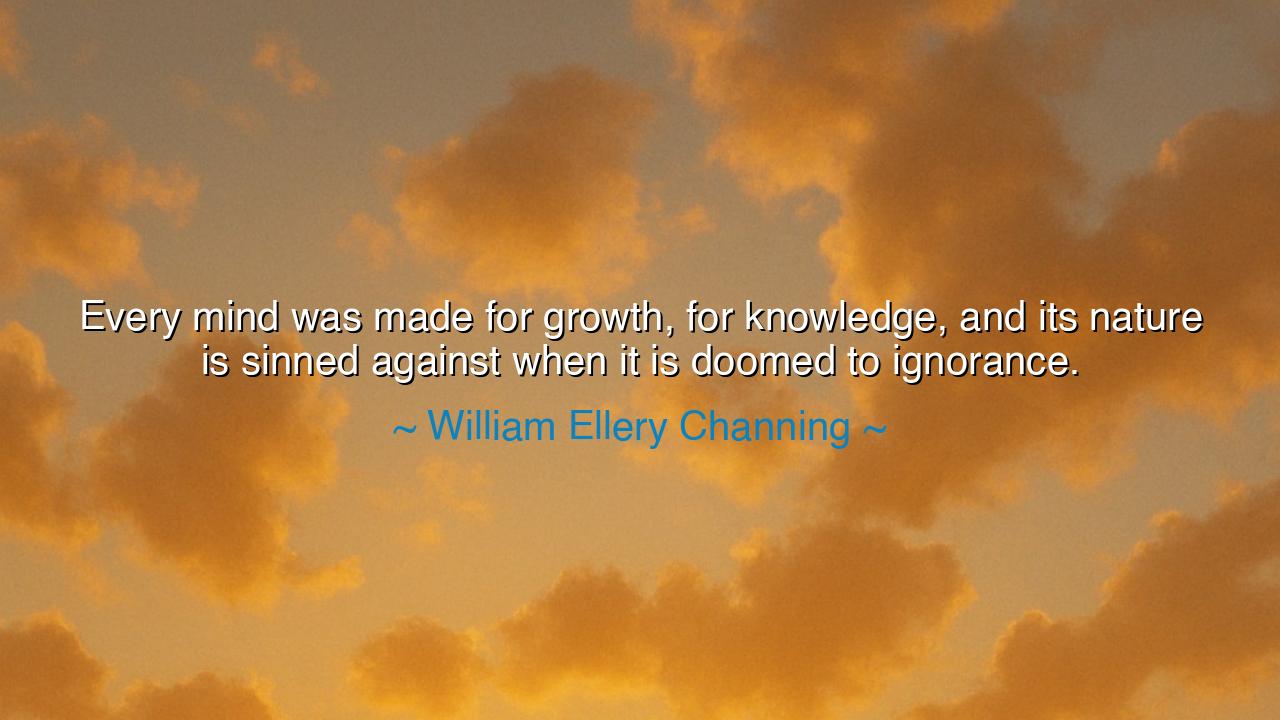
Every mind was made for growth, for knowledge, and its nature is
Every mind was made for growth, for knowledge, and its nature is sinned against when it is doomed to ignorance.






"Every mind was made for growth, for knowledge, and its nature is sinned against when it is doomed to ignorance." These words, spoken by William Ellery Channing, burn like a flame in the ancient lamps of wisdom. They call us to remember that the mind is not a passive vessel, but a sacred fire, entrusted by the divine to expand, to seek, to understand. To deny this birthright, to let the soul lie idle in the shadows of ignorance, is not merely a misfortune—it is a transgression against the very order of nature itself. For what is a mind that does not grow, but a field left barren, meant for harvest but choked by weeds?
The origin of this saying lies in the era of enlightenment, when men and women, stirred by the winds of freedom and reason, rose against the heavy chains of blind tradition. Channing, a voice of conscience in early America, believed in the dignity of each soul. He looked upon knowledge not as a luxury for the few, but as a universal inheritance, a sacred duty of mankind. His words echo the timeless truth: that to live without the pursuit of truth is to live diminished, cut off from the fullness of what we were fashioned to become.
Consider the story of Frederick Douglass, who was born into slavery, stripped of liberty and denied the right to learn. The law itself forbade him books and letters, for the masters knew that a mind awakened cannot be chained. Yet Douglass hungered for growth and secretly learned to read, bartering bread for scraps of literacy from poor white children. In time, his mind became a flame too bright for bondage, and through his words he became a liberator not only of himself, but of countless others. His life is a living testament to Channing’s truth: that the soul suffers grievously when denied knowledge, and it rises to majesty when nourished by it.
The ancients too bore witness to this eternal law. Socrates wandered the streets of Athens, declaring that the unexamined life is not worth living. He drank the bitter cup rather than betray his quest for wisdom. Likewise, Confucius taught that learning and reflection are the roots of virtue, and that ignorance breeds ruin both for the man and for the state. In every age, the wise have seen that ignorance is not mere emptiness, but a sickness of the soul, a weight upon the spirit, a sin against the divine order.
There is a fire that lies hidden in every heart—the fire of growth. It calls to us in childhood curiosity, in the restless wonder of youth, in the yearning questions of maturity. Yet too often, society snuffs this fire, binding men in dull labor, women in silence, children in narrow paths where questioning is forbidden. This is the sin that Channing warns of: the deliberate turning away from the mind’s calling. When a person is denied the chance to learn, to read, to imagine, their nature is not merely neglected but violated.
Let us then take up the duty that his words demand. Seek knowledge as one seeks bread for the body and air for the lungs. Read deeply, question boldly, listen humbly. Let not a day pass without learning something that stirs the heart or sharpens the mind. Do not be content with passive entertainment or shallow distractions—these are but shadows that darken the soul. Instead, feed the flame of your mind with truth, with beauty, with wisdom handed down through the ages.
The lesson, therefore, is clear: to live fully is to grow, and to grow is to know. No circumstance, no poverty, no adversity can strip from you the right to learn, so long as you hold fast to that hunger. And should you find another soul trapped in the prison of ignorance, extend your hand, as others once extended theirs to you. For in lifting them, you lift yourself, and in lighting their flame, your own burns brighter.
So I say to you, children of tomorrow: cherish the gift of the mind. Guard it, feed it, honor it. For every mind is a seed of infinite possibility, and the greatest sin is not that it may fail, but that it may never be given the chance to bloom. Seek knowledge, pursue wisdom, and let no chain of ignorance hold you fast. In this pursuit lies your freedom, your dignity, and your destiny.






AAdministratorAdministrator
Welcome, honored guests. Please leave a comment, we will respond soon